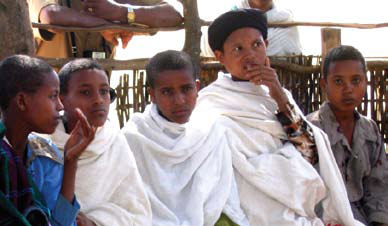Child Marriage: Education and Law Deter Early Marriages in Ethiopia
Reprinted from FrontLines December-January 2008 (PDF)
 |
| These young girls from rural Amhara Region all had their impending
marriages postponed due to interventions backed by USAID. Photo: Kidest Lulu, USAID/Ethiopia |
EAST GOJJAM, Ethiopia - Lule Fetene and Teferra Belay, both young men in their 30s, were each married when they were only 14 years old
- to brides that were even younger. Both were fathers before age 18, and now each has four children.
Early marriage between boys and girls is a deeply-rooted tradition in their communities, but the practice can produce large families, poverty, medical complications
due to early childbearing, increased vulnerability to HIV/AIDS, high rates of divorce, and interruption
of education.
Both men have now been trained by Pathfinder International and its local partner, Ethiopian Aid, to provide
reproductive health and family planning services to others in their community. Early marriage, say the two new health agents, is one of the greatest challenges they address.
The practice, common in Ethiopia, is used to balance debts and establish social and financial ties. Some parents believe early marriage will protect their daughters'
honor by preventing out-of-wedlock sex and pregnancy. Nonetheless, early marriage has proved damaging, especially to girls who are sometimes married before they reach puberty.
USAID is supporting a variety of efforts to combat early marriage in the country. In October, the Agency announced it would provide a $1.3 million, three-year grant to CARE to combat child marriage in
Ethiopia's Oromiya region. World Learning and the Population Council are also implementing programs with USAID backing, though currently
Pathfinder is operating the largest of these efforts.
Today in Ethiopia the legal age for marriage is 18, increased from age 15 in May 2005. The new rules seem to be having an impact in urban areas, and while statistics indicate that the age at first marriage in rural areas has not changed much, there has been improvement.
"The efforts of the entire community, coupled with our support, have helped stop over 10,000 early marriages in the Amhara region alone," said Dr. Kidest Lulu, a reproductive health specialist with USAID/Ethiopia. "I am extremely proud about the extensive collaboration
among the community - from girls' clubs to women's associations to the justice and education system - to curb early marriages."
Fetene and Belay say they want their children to have options they did not. Each has a 14-year-old daughter who is in school and is not engaged. Those teens and their siblings are being encouraged to stay in school. Both fathers say they want all their children to develop
their own capacity first.
When the pair hears of an engagement, they approach the parents to determine the age of the bride and groom. They counsel families to spend money they would have used for weddings to instead keep their children in school. In discussions
with parents, the health agents stress the lack of land and resources available to young couples, who have limited opportunity to improve their lives once burdened
with many children.
If parents persist, the two health workers report them to the child's school director or to the Amhara Women's Association, which will bring the case to the woreda (or district)
court. Parents or guardians who are found breaking the law can receive up to three years imprisonment.
Since 2004, Pathfinder's programs have helped defer or cancel 14,000 early marriages.
In addition, several thousand community and religious leaders and law enforcement officials are now educated about laws against the practice.
Back to Top ^
|




